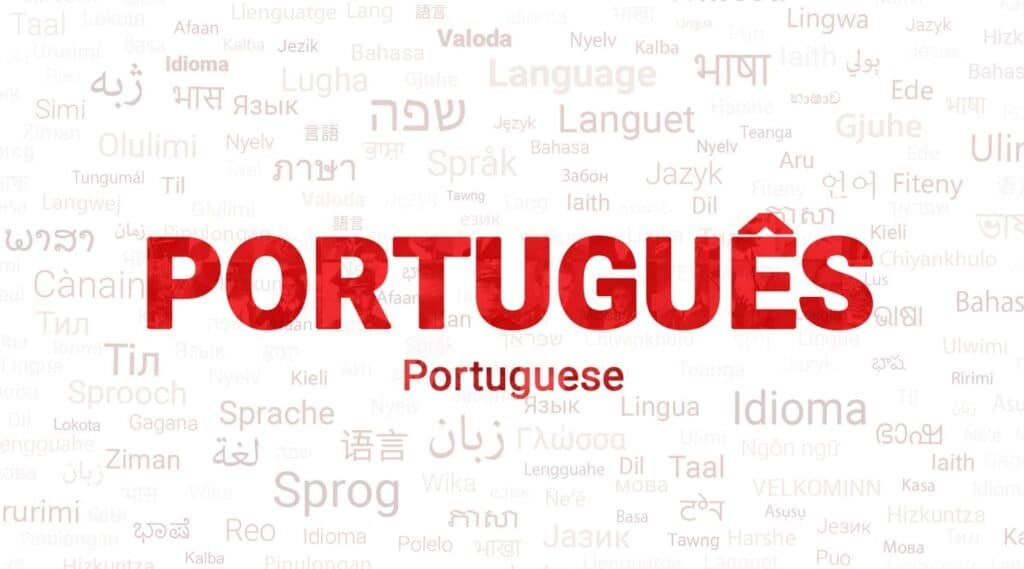Certified Portuguese Language Translator in Lucknow | +91 – 9100392160 | ANA Translation: The history of the Portuguese language can be traced back to the medieval Kingdom of Galicia, in the northwest of the Iberian Peninsula. Over time, it evolved from Galician-Portuguese, a language spoken by both Galician and Portuguese people. In the 12th century, with the lyrical compositions of troubadours, Portuguese started to establish its distinct identity.
The 13th century marked a crucial phase in the language’s evolution, with the emergence of the first written documents in Portuguese. The poetry of Dom Dinis, known as the “King Poet,” played a pivotal role in shaping the language and elevating it to a literary status. By the 16th century, during the Age of Discoveries, Portuguese had already spread to different parts of the world through explorers like Vasco da Gama and Pedro Álvares Cabral.
Portuguese belongs to the Romance language group, which includes languages such as Spanish, Italian, and French. It shares common Latin roots but has developed distinct characteristics, setting it apart from its linguistic relatives.
One notable feature is the nasal vowel sounds, a unique aspect of Portuguese phonetics. Additionally, the language is characterized by the use of definite and indefinite articles, gendered nouns, and a complex system of verb conjugations. These linguistic nuances contribute to the charm and complexity of Portuguese.
Beyond its linguistic intricacies, Portuguese holds immense cultural significance. It is the official language of Portugal, Brazil, Mozambique, Angola, Cape Verde, Guinea-Bissau, and São Tomé and Príncipe. The language serves as a powerful unifying force among these diverse nations, fostering a sense of cultural identity and shared heritage.
Portuguese literature, with luminaries like Luís de Camões and José Saramago, has left an indelible mark on world literature. Camões’ epic poem “Os Lusíadas” narrates the Portuguese maritime discoveries, showcasing the language’s capacity for poetic expression. In contemporary times, Portuguese-language literature continues to thrive, with authors exploring a range of themes and styles that reflect the diversity of Portuguese-speaking cultures.
While Portugal remains a stronghold of the language, the former Portuguese colonies have played a pivotal role in expanding the global reach of Portuguese. Brazil, the largest Portuguese-speaking country, has become an economic powerhouse and a cultural hub, exporting Portuguese through its music, literature, and vibrant arts scene.
The influence of Portuguese extends beyond the Lusophone world. International organizations, such as the Community of Portuguese Language Countries (CPLP), provide a platform for collaboration and cultural exchange among Portuguese-speaking nations. The diplomatic and economic ties fostered through the shared language contribute to a sense of interconnectedness on the global stage.
In the contemporary era, the Portuguese language has found a place in the digital landscape. The internet has facilitated communication among Portuguese speakers worldwide, allowing for the exchange of ideas, cultural expressions, and linguistic innovations.
Language learning platforms and online resources have contributed to a growing interest in Portuguese as a second language. The allure of Brazilian music, Portuguese cinema, and the diverse cultural offerings of Lusophone countries have attracted learners seeking to engage with the language on a deeper level.
While the Portuguese language has experienced significant growth and influence, it has also faced challenges. The diversity within the Lusophone world presents variations in pronunciation, vocabulary, and grammatical structures. Brazilian Portuguese, for example, differs in some aspects from European Portuguese, leading to debates about standardization and linguistic purity.
Moreover, the influence of English as a global lingua franca poses both opportunities and challenges for Portuguese. In academic and professional settings, proficiency in English is often prioritized, which may impact the prominence of Portuguese on the international stage. However, efforts to promote Portuguese as a valuable and distinctive language continue through education, cultural exchange programs, and language preservation initiatives.
In conclusion, the Portuguese language stands as a testament to the rich tapestry of human communication, weaving together the histories, cultures, and aspirations of diverse communities across the globe. From its medieval origins to its present-day vibrancy, Portuguese has evolved into a language of poetic expression, cultural identity, and international collaboration. As we navigate the complexities of a globalized world, the Portuguese language, with its depth and diversity, continues to shape narratives, bridge communities, and contribute to the ever-evolving mosaic of human linguistic expression.
The history of Portuguese-English translation is deeply rooted in the historical interactions between Portugal and England. Dating back to medieval times, diplomatic, trade, and cultural exchanges between these nations necessitated linguistic mediation. The first recorded translations emerged in the context of diplomatic treaties and trade agreements, reflecting the pragmatic need for accurate communication.
With the Age of Discoveries in the 15th and 16th centuries, Portuguese explorers like Vasco da Gama and Pedro Álvares Cabral made significant contributions to global navigation and, inadvertently, to the expansion of the Portuguese language. As these explorations unfolded, English navigators and traders engaged with Portuguese-speaking cultures, creating a demand for translation to facilitate mutual understanding.
Portuguese and English, though both rooted in Latin, belong to different language families and exhibit distinct linguistic characteristics. Portuguese is a Romance language, while English is a Germanic language heavily influenced by Latin and French. These linguistic differences pose challenges for translators, requiring a nuanced understanding of both grammar and cultural nuances.
One notable difference is the structure of verb conjugations. Portuguese verbs are conjugated for person, number, tense, and mood, resulting in a rich and expressive verbal system. English, on the other hand, relies more on auxiliary verbs for conveying these nuances. Translators must navigate these intricacies to maintain the tone and subtleties of the original text.
The use of gendered nouns in Portuguese adds another layer of complexity. Nouns are assigned either masculine or feminine genders, influencing adjectives, articles, and pronouns. Translating these gender-specific elements accurately is crucial to preserving the original meaning and cultural context.
Literary translation, in particular, plays a vital role in bringing Portuguese literature to English-speaking audiences and vice versa. The works of renowned Portuguese authors such as José Saramago and Fernando Pessoa have gained international acclaim through translation. The challenge lies not only in conveying the literal meaning of the words but also in preserving the cultural nuances, stylistic elements, and the unique voice of the author.
Translators of Portuguese literature often grapple with the saudade, a Portuguese term encompassing a deep emotional state of melancholic longing. Capturing such nuanced emotions in English requires a deep understanding of both languages and the ability to convey the essence of the original text.
Similarly, the use of regional dialects, idioms, and wordplay in Portuguese literature adds layers of complexity. A skilled translator must navigate these linguistic intricacies while maintaining the literary quality of the work. The success of literary translation lies not only in accuracy but also in the artistry of recreating the aesthetic and emotional impact of the original text.
In the realm of business and diplomacy, accurate communication is essential for building relationships and facilitating transactions. The growing economic ties between Portuguese-speaking countries and English-speaking nations underscore the importance of effective translation in these domains.
Business translation involves the conversion of documents such as contracts, marketing materials, and financial reports. The precision of language in these contexts is paramount, as mistranslations can have legal and financial consequences. Translators must not only be bilingual but also well-versed in the specific terminology of the industries they are translating for.
Diplomatic translation, on the other hand, extends beyond the business realm to encompass political and international relations. Accurate translation of diplomatic documents, treaties, and speeches is critical for fostering mutual understanding and cooperation between nations. Translators in diplomatic settings play a diplomatic role themselves, ensuring that the translated text maintains the intended tone and avoids potential misunderstandings.
We offer below services for Certified Portuguese Language Translator in Lucknow
- Portuguese to English Translator in Lucknow
- English to Portuguese Translator in Lucknow
- Technical Portuguese Translator in Lucknow
- Portuguese Translator for Machine Installation
- Portuguese to Hindi Translator in Lucknow
- Hindi to Portuguese Translator in Lucknow
- Portuguese Translator for Business Meetings in Lucknow
- Portuguese Translator for Conference in Lucknow
- Portuguese Translator for Market Research in Lucknow
- Birth Certificate Portuguese Language Translation in Lucknow
- Death certificate Portuguese language Translation in Lucknow
- Educational Document Portuguese Language Translation in Lucknow
- PCC Portuguese Language Translation in Lucknow
- Certified Portuguese English Language Translation in Lucknow

